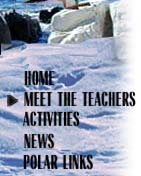
|
|
6 December, 1996
I received an e-mail message the other day asking me how the work that is
being done will continue once we leave Antarctica. This is a good time to
focus on that question because it was a day that I spent being a lab rat.
The main theme of the project is chemical ecology but an important spin off
is drug discovery. Although the latter sounds much more interesting and
useful, understanding the chemical ecology is a starting point to knowing
where useful natural products might be found. The natural products chemists
in the group take the approach that certain organisms that have survived in
the environment have evolved chemical mechanism which defend them in their
environment. They focus on organisms that have no obvious defenses such as
fighting, fleeing, very rapid growth rate, massive reproduction, or very
short reproduction cycles. After the organisms are collected, compounds,
which play no known role in the physiology of the animal, are extracted. To
try to determine what role the compound plays in the animal, a number of
assays are performed. There are different types of assays, those, which are
ecologically relevant, and those that are more general. To do the former,
microbes that are present in the natural habitat of the animal are isolated.
As a more general assay, we do the same type of test with bacteria and
fungus which humans are more likely to be exposed. If a colony will grow in
the presence of the compound, more work is required to determine its role.
That might mean further assays by a student under Bill's direction or by a
collaborating drug company. Compounds, which are cytotoxic, might have to be
alter so they will only target specific cells. If a useful drug is
discovered it must then be synthesized. It would be far too expensive to
make drugs from extracts taken from the natural environment. To date we have
collected 171 unique species, and a number that have never before been
identified. Bill told me before he left that it would probably take five
years to process all of them. We'll be back again next year to continue with
the process.
It seems like it will be a never ending project, our environment is one big
chemical battle ground, with organisms competing for resources necessary for
their survival. Unfortunately for us, some of them survive at our expense
and we become diseased.
Contact the TEA in the field at
.
If you cannot connect through your browser, copy the
TEA's e-mail address in the "To:" line of
your favorite e-mail package.
|
